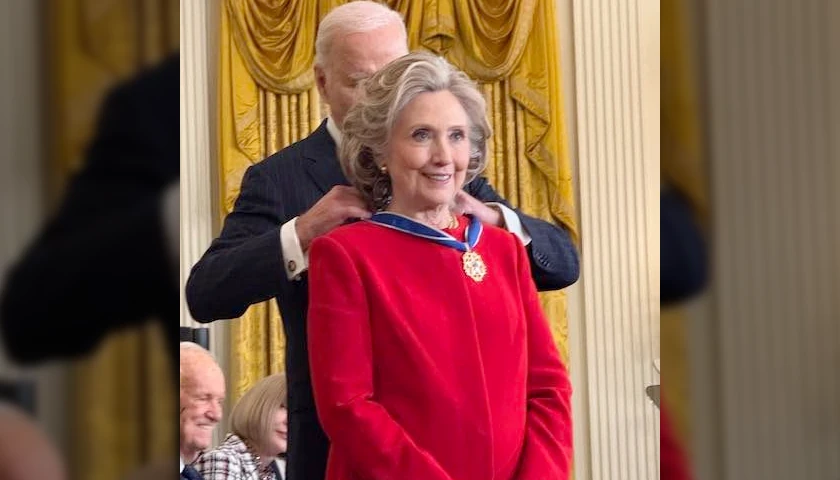by Bethany Blankley
Governors from 15 states are sounding the alarm over an executive order issued by President Joe Biden tasking his administration to “conserve” 30 percent of all land and water in the U.S. by 2030.
Known as the “30 x 30 plan,” the directive is part of a United Nations Agenda 2030 land and sustainable development goal, which directs nations to conserve land and water to combat climate change.
Biden refers to the policy as part of the United State’s acceptance of rejoining the Paris Agreement, a deal former President Donald Trump pulled out of.
The United Nations goal is to globally “get to a 2° C stabilization pathway and deliver climate-change resilient landscapes” by conserving land and water usage. The United Nations Convention to Combat Desertification argues that by conserving land and water, the remaining emissions gap could be closed by up to 25 percent and reduce the risks posed by climate change. The best way to do this, according to the plan, is for governments to control land, not private landowners.
Biden’s executive order, “Tackling the Climate Crisis at Home and Abroad,” involves a multi-federal agency approach.
Currently, the Biden administration considers roughly 12 percent of land and water in the U.S. to be “in conservation.” It includes wilderness lands, national parks, national wildlife refuges, state parks, national monuments, and private lands with permanent conservation easements. More than doubling this acreage to 30 percent is equivalent to conserving the geographical size of Nebraska every year for nine years, Nebraska Governor Pete Ricketts, a Republican, argues.
Ricketts leads a group of Republican governors from the states of Alabama, Alaska, Arizona, Arkansas, Idaho, Iowa, Mississippi, Montana, North Dakota, Oklahoma, South Dakota, Tennessee, Texas and Utah in opposition to the plan.
“We are deeply concerned about any effort to enlarge the federal estate or further restrict the use of public lands in our states,” they wrote.
Biden’s plan would not only infringe on the private property rights of their residents but also significantly harm their economies, they argue.
It’s the states’ duty and prerogative “to manage their own lands and waters for the well-being of their citizens – free from federal interference,” they wrote. “It is precisely because we depend on our lands to be available for future generations to enjoy and use [that], without greater input into this initiative, we must resist implementation of the 30 x 30 program.”
They argue no constitutional or statutory authority of the president or federal agencies exists to set aside and permanently conserve 30 percent of all land and water in the United States.
“Nowhere in the laws of our nation is the authority delegated by Congress to the President or executive agencies to unilaterally change the policies governing land use in America,” they write.
The governors asked Biden to answer 12 specific questions, to which they have not received a reply.
Ricketts signed his own executive order banning Nebraska from supporting federal conservation programs without the governor’s express authorization.
While the Biden administration has not released more details about the plan, the U.S. Departments of the Interior, Agriculture, Commerce and Council on Environmental Quality published a preliminary report outlining a way to implement it.
“I don’t believe that the federal government is going to try to come out and just take land, through eminent domain, for example,” Ricketts said. “I believe the way they’re going to try and cover these goals is by creating more ways that they can regulate you and take your private property rights away.”
However, he also said, “Either they’re going to fail to get to 30 percent, or they’re not telling us something else about how they’re going to get to 30 percent.”
U.S. Representative Lauren Boebert (R-CO) argues Biden’s “land grab” won’t stop with 30 percent of land and water in nine years because a proposal submitted by the Center for American Progress in 2019 called for “conserving” 50 percent of all U.S. land and water by 2050.
“The federal government already has 111 million acres locked up in wilderness status and owns more than 640 million acres, so where will it get the 681 million additional acres proponents say are necessary to lock up 30% of the country’s land and waters in the next nine years?” she asks. “The Biden administration has explicitly stated that private property is not exempt from the 30 x 30 initiative.”
Boebert added that the federal government would take private property using eminent domain as it already has in her district. More than 55 percent of her congressional district is federal land, and that keeps expanding, she argues. In response to Biden’s plan, Boebert introduced the “30 x 30 Termination Act” in Congress to prevent private land from being seized by the federal government.
“America was founded on private property rights, but the 30 x 30 program relies on the false assumption that private property owners don’t know how to manage their land responsibly,” Boebert said. “Instead, it proposes that we be beholden to the administrative state to govern the land that’s America’s lifeblood.”
– – –
Bethany Blankley contributes to The Center Square.





